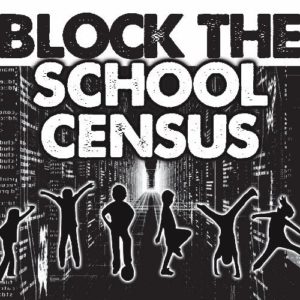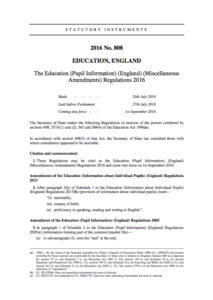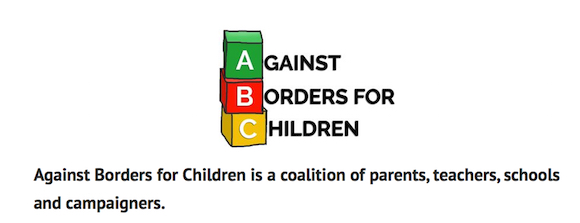Below we interview members of a new campaign, Schools ABC, set up to resist the encroachment of border controls in schools.
What is the Schools ABC campaign? What were the concerns that led you to set it up?
 The Against Borders for Children campaign started with two aims – to stop the Department for Education collecting country-of-birth and nationality data on 8 million school pupils aged between 2 and 19; and to encourage and assist tens of thousands of parents, teachers and schools to boycott the government data collection scheme.
The Against Borders for Children campaign started with two aims – to stop the Department for Education collecting country-of-birth and nationality data on 8 million school pupils aged between 2 and 19; and to encourage and assist tens of thousands of parents, teachers and schools to boycott the government data collection scheme.
We came together as a group of concerned individuals in response to the announcement of the new questions and the open admission that the policy was designed to assess the impact of immigration on the schools sector, in the wake of a review into ‘education tourism’ called by Nicky Morgan, Justine Greening’s predecessor as secretary of state for education. The policy was announced before the EU referendum took place, but many of us, especially after the result, were concerned about the implications that it might have for immigration enforcement. In July, one campaign member was contacted by a parent who had received a letter from their school asking for nationality data by the end of term. That parent also disclosed that they knew other parents who would take their children out of school due to fear of deportation. It was this fear, plus the immediate increase in racist and xenophobic attacks following the referendum result, that spurred us into action.
Tasking schools with the collection of such sensitive data, and in such a public way with no regard to the welfare or safety of the children involved, felt like a new low in banal state racism. It was as if the government was saying ‘just another form, just another box to tick, and then we will separate you into natives and foreigners and keep that data, insecurely and with identifying features, forever.’ The campaign was formed to tell people what was happening and to persuade them that these dull bureaucratic processes are dangerous. It marks the beginning of the government saying that even children are foreigners first, and children second.
Do you see the changes to the school census as part of the hostile environment strategy against undocumented migrants launched by Theresa May when she was home secretary?
Unfortunately the logic of the ‘hostile environment for irregular migrants’ hasn’t had any sustained parliamentary opposition, leading to a range of policies that make life difficult for migrants with and without regular status, and minority ethnic Britons too. Of course, part of the unpleasantness is the requirement to prove constantly that one has the right to be here. We have no doubt that the school census is being used as an additional chilling device, designed to make the most vulnerable more scared. It is little surprise that due to lack of guidance from the DfE, the outcome has been various schools devising their own forms of ethnic profiling for the census, ranging from asking for passports, to entering ‘British’ for white children, while demanding additional information from all children of colour. Our point is that this chaotic on-the-hoof racism is intentional: farming out the tasks of immigration enforcement to schools without guidance or safeguards was bound to lead to some schools falling back on long-held racisms to guide their actions.
The campaign was publicly launched only a couple of months ago and seems to have achieved a lot in a very short time. Can you tell us about your organisation, what wins you have had and how you have done it?
The campaign successfully initiated a mass boycott of data collection with thousands of families refusing to submit data. In this first period the campaign achieved coverage in almost every national newspaper including the Guardian, Mail, Sun, Times, Independent. To understand the impact of our campaign, it is helpful to hear examples of how school staff and families have used our campaign information. An Early Years Foundation Stage teacher gave this account:
‘As an EYFS teacher one of my duties was to meet with families to complete enrolment forms. The school had amended the previously used form for the school census and added a table requesting the new data collection of “country of birth” and “nationality”. It also asked for “immigration status (if applicable)”. No staff members were briefed on these additions. I shared my concerns with the headteacher. I also informed him that I would not collect the information under any circumstances. He spoke to me the next day and informed me that he agreed with my concerns and that the school would not collection this data from EYFS classes (75+ children). I shared some documents from defenddigitalme (ABC’s sister campaign) with the leadership team and they later informed me that they would not collect the new data and will be informing the governors regarding the matter. I also made sure admin staff were aware of the changes and the school position. I also checked some the forms as they were returned after being sent home.’
We had another significant win on the holding and potential sharing of the data. In July, schools standards minister Nick Gibb said that the DfE didn’t plan to change its data handling processes, meaning that nationality/CoB data collected through the autumn census would have been accessible to the Home Office, including for immigration enforcement purposes, in the same way that children’s names and addresses had been previously. In October, following sustained public pressure and media coverage, Lord Nash, parliamentary under-secretary for the schools system, reportedly wrote to peers to say that new nationality/CoB data will not be held in the National Pupil Database and will not be accessible to the Home Office, which represents a significant win for the ABC Campaign. However, we have yet to see the new data-sharing agreement between the Home Office and the DfE. If it is not on a statutory footing then it can be changed at any time, which doesn’t give any real protection.
We believe that it is the impact of the campaign that led to the issue being debated in the House of Lords when previously there had been no parliamentary debate on the issue.
How did you manage to get such high-profile media interest in the campaign?
We are lucky to have campaign members with extensive media experience, and others who know how to build critical alliances around particular issues. Working in partnership with big organisations like Liberty, Privacy International and the Refugee Council on initiatives like our open letter to Justine Greening has helped us to garner media interest while remaining in control of our broader campaign tactics and aims.
Second, the government had, we think, been relying on public disengagement from bureaucratic processes of data collection, and also on the assumption that anything is acceptable if it is in the name of immigration control. So what we chose to do was focus public attention squarely on the welfare of children, and on what we are not being told: that the data is being sent to central government, and that it was initially going to be held in a database that is not only accessible to the Home Office, but has been accessed thousands of times for immigration enforcement purposes. That has turned out to be a hard story to ignore.
One of the difficulties of the campaign which I know you’re aware of is the necessity to avoid scaring parents to the extent that they stop sending their kids to school – which is perhaps the aim of the changes to the census. How do you avoid this danger?
As you recognise in the question, this fear factor appears to have been built into the process. Our allies who have long experience of working with unaccompanied migrant children tell us that they have known past instances where the school asking for documentation such as a passport has resulted in a young person never returning to school. If we look at the introduction of other policies: employers, landlords, and NHS workers having to check immigration status, for example, we know that the deterrent effect is similar and intentional. People don’t necessarily leave the country, but those with irregular status withdraw from services and communities. The expansion of the school census is designed to exploit this kind of vulnerability, so that if you feel uncertain or your immigration status has not been confirmed, you might decide that the census questions are too much of a risk. The state’s view would seem to be that if the child is taken out of school it is a budgetary win, and if they are easier to deport it is a logistical win. Nowhere is there a discussion of the impact on the child and on all children, regardless of status.
The reality is that for as long as the government goes unchallenged, and parents and the public are uninformed, the danger will remain. School records are already being used for immigration enforcement purposes, and people have a right to know. Raising awareness must include work with teaching unions so that their members can support and reassure families, and spot where the census may be the factor that leads to a child’s absence from school. Raising awareness also includes telling families clearly that they have the right to refuse to answer these questions, and that refusal has no consequences for their child or for the school. Some school heads seem to be under the misapprehension that this data will lead to additional funding for the school. This is not the case and teachers, families and school governors need to impress this on their school leadership. This is a process that harms children and leads to no benefit for the school.
At the end of October the House of Lords voted to support a ‘motion to regret’ the statutory instrument which introduced the changes to the schools census. What does this mean? What effect will it have?
The new policy to collect country of birth and nationality data was introduced by what is known as a Statutory Instrument (SI). This particular SI (2016/808) entered into force on 1 September 2016, but can be revoked – which would mean the end of the policy – if the right kind of motion to challenge it is passed in parliament. The motion of regret that the Lords debated and agreed had no effect on the SI itself, but sent a strong signal to the government about the depth and scale of the concerns on the issue. It’s really important that politicians hear and reflect on the concerns of parents and children. Lord Storey said during the debate:
‘[T]here is real concern among members of different ethnic groups about victimisation and being targeted. I am afraid that this proposal has all the hallmarks of racism … Children are children, and to use their personal information for immigration enforcement is disingenuous, irresponsible, and not the hallmark of a tolerant, open and caring society.’
It’s horrible that in this day and age he had to say it, but it means that politicians of all parties and none are now aware that this is happening in schools up and down the country. Let’s hope they’re motivated to act!
 What is needed now in either the Commons or the Lords is what is called a fatal motion, also known as a prayer motion. If carried, such a motion would have the effect of revoking the SI, which would be the end of this damaging and divisive policy.
What is needed now in either the Commons or the Lords is what is called a fatal motion, also known as a prayer motion. If carried, such a motion would have the effect of revoking the SI, which would be the end of this damaging and divisive policy.
Apart from the schools census, are there other issues you want the campaign to address?
The encroachment of border controls into the lives of both children and adults is unfortunately worsening by the day. Much of this is done in a way that normalises border control as part of the everyday bureaucracy of public institutions, so schools and other aspects of children’s lives are likely to become increasingly punctuated by practices of immigration control.
Schools ABC is concerned about all of the ways in which borders are brought into schools and the ways in which border controls are used to deny children schooling and other aspects of an ordinary childhood. We have particular and urgent concerns about proposals to extend demands to demonstrate immigration status when accessing maternity care. The ugliness of the treatment of refugee children throughout their journeys to and across Europe and the shocking barriers that have been placed in the way of family reunification and the treatment that child migrants face once they do reach the UK all confirm that there is an urgent need to keep on campaigning for the rights of children in the face of racist and inhumane immigration laws. Schools ABC will continue to highlight and challenge any instance where the rights of children are endangered in the name of border control.
What are you asking supporters to do?![]()
Please keep visiting our website and sharing resources and information, particularly with family and friends who may not be aware of the implications of the new questions for the school census.
Please keep telling other parents/teachers/school staff/school governors about the new questions and that answers don’t have to be given – we have translated leaflets on our website too.
Ask schools how they plan to protect children’s privacy in light of the recent discovery that data is shared with the Home Office – we will be uploading a model letter for this purpose.
Write to MPs with their concerns and to ask what they’re doing to oppose this new data collection – the letter templates on the SchoolsABC site can be adapted for MPs.
Teachers and other school staff should ask their union reps for guidance and support on the issue. Raise your concerns at your local branch meeting. What training or guidance has the employer offered in relation to this new task? How can staff reconcile their duty of care to children with the demand to collect and record this information? Ask your trade union representatives to raise these questions in their negotiations with your employer.
If you are a parent/teacher/school staff member/school governor who is willing to talk to the press or if you have any case studies either about data being collected badly or examples of successful resistance, please contact the campaign. We are always eager to gather more information and to add more voices to the campaign.
MOST IMPORTANTLY, get ready for another boycott on 19 January 2017 when the next School Census and Early Years Census take place. Watch this space for more information and advice on this.
Related links
Schools Against Borders for Children
View Schools ABC’s open letter to Justine Greening MP here

